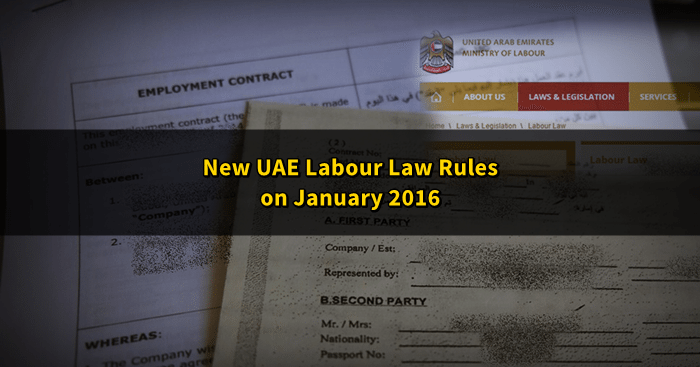Workers in the UAE, the new UAE Labour Law rules will take effect this January 2016. This will bring forth more transparency between the employer and employee and covers conditions for terminating employees, labour permits to work for new employers and application of ministry-approved contracts.
UAE Labour Law Revisions
One of the notable updates is that Job Offer letters will be legally binding. The Ministry also mandates that the employer ensures that the workers have seen the job offer and have agreed on it in a language that they understand. The new rules will help make employees become more content and secure in the workplace.
Here’s a few notable updates:
Standard Work Contract
- A worker must be presented with an employment offer that conforms with the unified contract then signed by him or her as stipulated under MD 764 of 2015 on ministry-approved standard employment contracts.
- All contract renewals in force beforehand must use the new unified contract, in addition to the employment offer, the terms of which cannot be altered or substituted unless approved by the ministry.
- No clauses can be added to any contract unless compliant with and approved by the Labour ministry.
Terminating the Work Contract
- MD 765 meantime stipulates that an employee contract, which covers not more than a two-year term can only be terminated if: 1) The term of the contract expires; 2) The employer and employee mutually agree to end the contract; 3) Either party acts unilaterally to terminate the contract but complies with legal consequences of early termination including notification in writing at least one month in advance and not longer than three months.
- A two-year contract can also be terminated if a worker commits violations prohibited under Article 120 of the Federal Labour Law.
- Non-term contracts can be terminated if: 1) Both parties consent to termination; 2) one party gives notice of termination at least one month in advance and not exceeding three months; 3) if one party unilaterally acts to terminate but bears consequences of early termination.
- The non-term contract can also be terminated if an employee violates labour law rules under Article 120.
Granting a New Work Permit
- Article 1 of MD 766 of 2015, which covers rules and conditions for granting a permit to a worker for employment by a new employer stipulates that a new permit can be granted when both worker and employer mutually consent to terminating the contract during the term, provided that the worker has completed at least six months employment or if workers qualify for a skill set series classified by the ministry.
- The same decree also notes that a new permit can be issued for a worker whose employer terminated him or her without reason provided the worker has completed six months.
- The six-month rule is waived if the worker has skill levels classified by the ministry as 1, 2, and 3 meaning those who hold a university degree, post secondary diploma or high school diploma, respectively.
- Term contracts can be terminated with notice periods of between one and three months if the terminating party continues to honour contractual obligations for the term duration or if the terminating party indemnifies the other party in the amount not exceeding the equivalent of three month’s gross wages.
- A worker may be granted a work permit for all term and non-term contracts if it is determined that the employer has failed to meet legal and contractual obligations, including but not limited to when the employer fails to pay the worker’s wages for more than 60 days.
- A worker may also be granted a permit if the labour ministry confirms that the employing company has not provided work due to the firm being inactive for more than two months and if the worker reports to the ministry during the company shutdown.
- Work permits may also be issued in cases in which a labour complaint is referred by the ministry to the labour court and final ruling in favour of the worker who is terminated early or is owed outstanding wages less than two months of dues for end of service.
For reference, you can check out the UAE Ministry of Labour Law from the official website of the Ministry of Labour – UAE Labour Law | MOL
Please be advised that this applies to companies registered under the UAE Ministry of Labour. If you work for a freezone company, you can refer to your specific Freezone Headquarters office for specific updates. Here’s a list of Freezone areas in the UAE.
